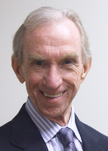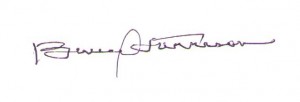This post is part of The Plank Center’s Legacies from Legends in PR Series that was begun in recognition of the 40th Anniversary of the Public Relations Student Society of America in 2007.

Led PR for Freeport Minerals’ launch of copper mine in Indonesia. Managed chemical industry’s “ Silent Spring” response. Coached CEOs at first UN Earth Summit. Ran PR firm for 25 years. Author of three books on PR, green communications. Included in PRWeek’s “100 Most Influential PR People in 20th Century,” Washington PR Hall of Fame. Adjunct Professor at Georgetown University. Recipient, Betsy Plank Distinguished Achievement Award, 2001, and Arthur W. Page Society’s Distinguished Service Award, 2009.
Did your parents tell you to work hard and make good grades so you’ll get a good job? My dad did me a great favor. The day I turned 16, he told me I had a job in the local cotton mill. “If you want to go to college,” he said to me as I looked at him with a dropped jaw ‘(what me? manual labor?)’, “you need to know what hard work is like and you need to earn some money.”
The manual labor didn’t kill me. I made enough money to pay first-year tuition, and I went off to Tuscaloosa with all kinds of incentive to get out and get a degree.
My parents came to my Bama graduation. They glowed when I got a little recognition as Sigma Delta Chi journalism honors graduate (mostly for editing The Crimson White which was part of my fear-driven “working hard” process), and Dad shook my hand. “I knew you could do it,” he said; adding: “I don’t ‘spect I’ll see you working in the mill this summer.”
No way. I was off to the big leagues. My senior year at Alabama, I had gone to New York to see my classmate Gay Talese. I met him at his little, third-shift shared desk at the New York Times where he was writing obits—and I thought: This is it! I would be a newspaper reporter on some major paper and write books and make money. But of course, it was his—Gay Talese’s— “it.” I had to find or stumble upon my own.
After a short run as a newspaper reporter, an Alabama congressman hired me as his press secretary. I was in a big league, in Washington and, without having planned on it, in public relations. What can I tell you I’ve learned in the long run since, besides the fact that your parents are right, you do need to work hard?
You’ve got lots of options. Along with other Chief Communications Officers in this Plank Center series, I recommend the corporate career. But your college education, grasp of PR principles, talent (like a lot of my peers, I put writing at the top), and attitude (essentially, to be of service) can be put to work in every profession from medicine to education, from real estate to pro sports, from business to NGO. You are the specialist who is the generalist. Communications expertise is highly transportable. That’s heartening in hard times.
You need to create stakeholders. Wherever you go, you need to know in every program, every initiative, every competitive challenge or crisis, who counts the most in shaping your odds to win. Arthur W. Page said a company needs public permission to succeed. Okay, but not everybody’s permission. Zero in with this question: Whose opinion/action will CRITICALLY hurt or help our mission, campaign or recovery from a problem? Learn to discern, engage with and sustain those critical stakeholders and you’ll be linked to the mind of the CEO and ahead of 85 percent of the folks around you.
Don’t speak. Well, not first anyway. Take time to engage the brain. Study symptoms, connect the dots, analyze options, ask a lot of questions and use the #1 power of the PR person: the power of the first draft…of the plan…of the message. Jot this down: L-I-I: listen, incubate, initiate. Be the one who listens long and speaks short.
Build your support. Consider my definition of effective public relations management. It’s the ongoing process of knowing, creating and sustaining the stakeholders needed for your organization’s success. And if you think about it, that’s precisely the key to your personal success.
